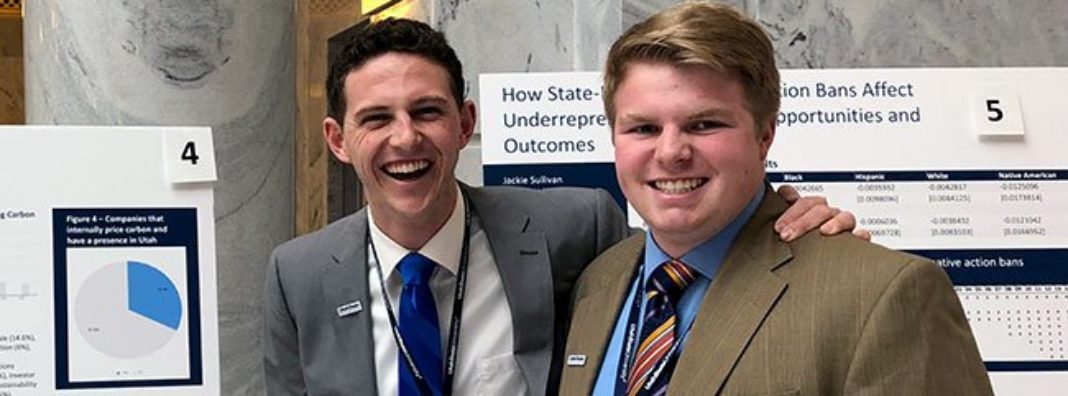
Undergraduate Research Fellows from the Center for Growth and Opportunity at Utah State University presented research at the Utah State Capitol in Salt Lake City, on February 28, 2018. Their presentation was part of the annual event Utah’s Research on Capitol Hill, organized by Utah State University.
“When we applied for Research on Capitol Hill last fall, we were excited about the chance to present research on the social cost of carbon,” said Marshall. “We didn’t know the great opportunities we would have because of the event.”Students Hayden Hubbard, Mcklayne Marshall, and Christopher Cottle presented their research “Carbon Pricing
Throughout the day spent at the capitol, the three economics and finance students spoke with senators and other event attendees about their research and findings.in the Private Sector: How Science, Politics, and Climate Change Influence Business Strategy” to legislators in the rotunda of the state capitol.
“Each person offered unique insight into our research topic, and the elected officials were especially interested in what we had learned,” said Hubbard. “Having these conversations in the Capitol building helped us to fully realize the level of what we had accomplished.”
The students’ research project grew from a small idea when they applied to present at the capitol, to a full-length academic article by the time of presentation.
“Being engaged in that process has been incredibly rewarding,” said Cottle. “Even more rewarding, was the chance to present our findings in a real-world setting. Making an impact and discussing this issue at Research on Capitol Hill was one of the most rewarding experiences of the year.”



Carbon Pricing in the Private Sector: How Science, Politics, and Climate Change Influence Business Strategy
Abstract
Economist Michael Greenstone called the Social Cost of Carbon (SCC) “the most important figure you’ve never heard of”. The EPA defines the SCC as “an estimate of the economic damages associated with a small increase in carbon dioxide (CO2) emissions, conventionally one metric ton, in a given year.” The dollar figure assigned therefore represents “the value of damages avoided for a small emission reduction (i.e. the benefit of a CO2 reduction).” The current dollar value has different estimates in each state and within each public and private company. The process of calculating the SCC is immensely complex and relies on numerous variables that are highly disputed by scientists, private interest groups and policy makers. Our purpose is to examine motives and trends behind states and public and private companies using SCC estimates.
